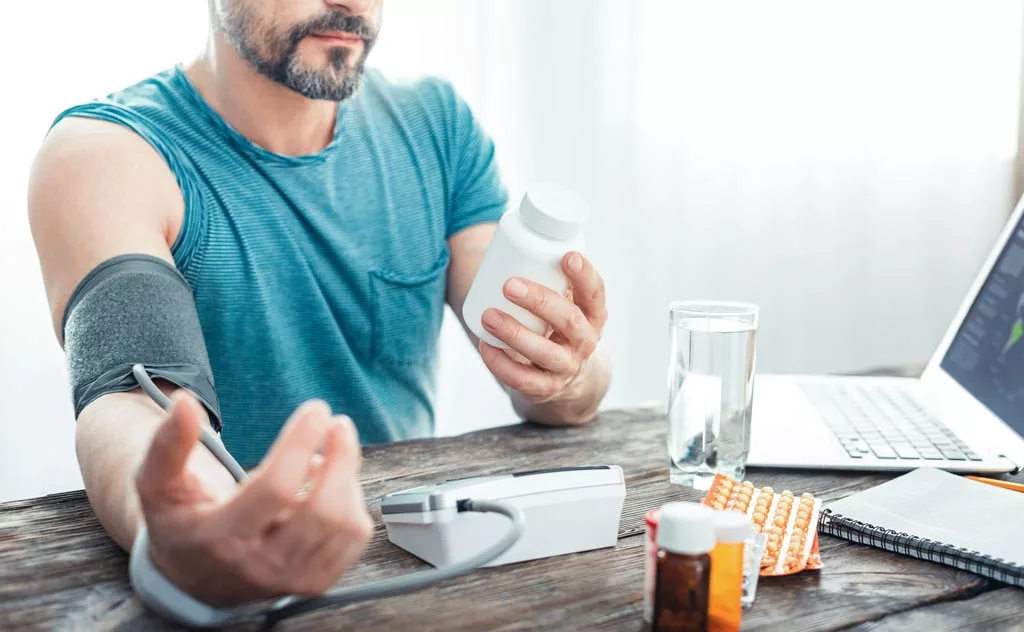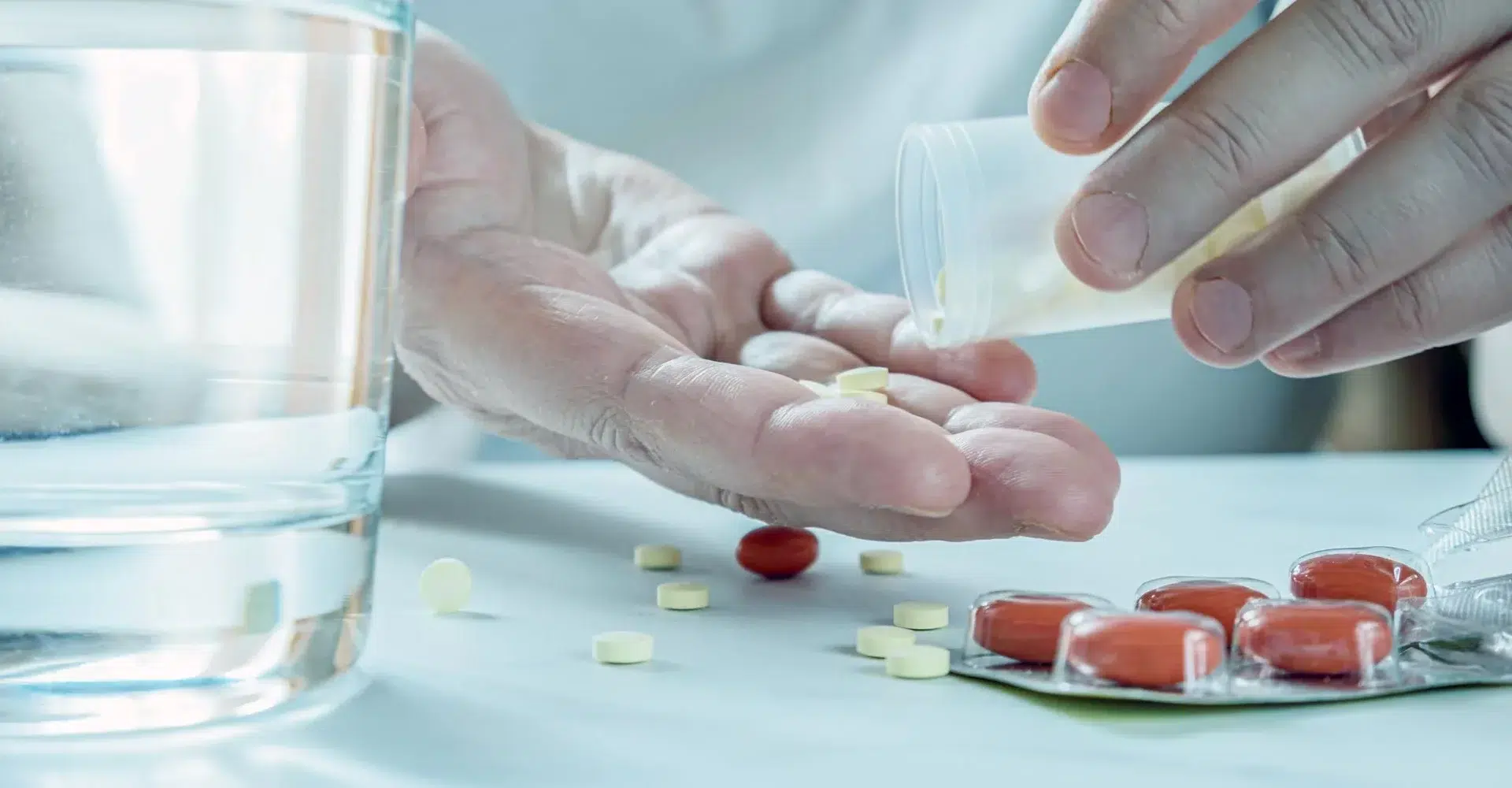
Self Medicating to Deal With Stress
Stress is an unavoidable part of daily life, and while it can be a positive motivator in some cases, it also takes a toll on our bodies in many ways.
A constant state of stress can lead to high blood pressure and heart disease, weakens the immune system, causes stomach problems and headaches, leads to muscle tension and pain, and more.
Keep reading to find out more about how to deal with stress in a healthy manner, and how to get help if you’ve been self medicating to deal with stress.
24 Hour Substance Abuse Hotline
What exactly is self medication?
Table of Contents
People who self medicate essentially take substances and/or engage in activities in order to control their emotional or mental state, manage uncomfortable emotions, or in some cases, manage symptoms of a variety of illnesses. They are not taking the substance or engaging in the behavior as prescribed by a mental health professional. People can self medicate with a variety of substances. They may use prescription drugs or alcohol, or, in some cases, even illegal drugs.
Self Medication and the reasons people do it.
As was said above, there are many various reasons people self medicate. Oftentimes, people with mental health problems can fall into the trap of self medication. This can be as seemingly common as stress but potentially much more serious.
The truth is that a whole host of mental health issues and mental illnesses are responsible for a vast portion of persons engaging in self medicating regularly. People with mood and anxiety disorders, conditions like major depressive disorder, bipolar disorder, and even post traumatic stress disorder all fall under the blanket of the population that is at risk for falling prey to self medicating.
Stress in modern day life

People with emotional pain, depression, or mood disorders will often self medicate because they feel better when they take a certain medication or use a particular method of relaxation. In some instances, the end result can be the same as with drug abuse: the person becomes dependent on their mood-altering substance, and if they fail to have it readily available, they feel anxious, have negative emotions, irritable, and unable to function normally.
This is not to say that only a person with a mental health disorder can end up self medicating. There are tons of life challenges that can result in someone turning to self medication as the solution. This might include chronic pain or other medical issues.
The dark truth about self medicating
Let’s get this out of the way. Self-medicating is a form of substance abuse. Whether as a desperate attempt to stem the hurt of a physical chronic pain issue or to help with mental health issues, there are many reasons that, on a human level make the habit one that deserves empathy and not judgment.
Still, ultimately, the bottom line is that self medication is, clinically, a substance use disorder. Substance use disorders can fall into various categories. Regardless of if the substance is drugs or alcohol is irrelevant largely.
At the end of the day, self medicating boils down to a habit that is done without professional medical intervention, observation, or guidance and so, it only serves to exacerbate whatever underlying mental illness the person is combatting internally to begin with.
The risks associated with self medicating to deal with stress
Regardless of its emotional, mental or physical, most of the time people begin the habit of self medicating to deal with stress. There are a host of risks associated with the habit that should be noted.
Many treat self medicating as a cure but the truth is that in many cases, in addition to introducing a whole lot of new problems, it can actually tend to make the original symptoms worse. For these reasons and more, it is important to understand just what the risks are. By understanding the risks, you will know just how critical it is to stop self medicating.
It results in the development of a substance abuse habit.
There is no way around it. People self medicate. Depending on the substance, this fundamentally creates a drug and alcohol dependence within the person. Whether it be alcohol abuse or drug abuse, the point is that there comes a point where both the body and mind cannot exist in a state of balance without alcohol or drugs.
Drugs and alcohol are incredibly powerful substances and, once they have a stranglehold on our systems, releasing that can be a very difficult process.
It does not actually help with the mental health issues
Mental health issues are arguably one of the more prevalent reasons people begin self medicating. For those dealing with a mental health issue or mental illness, the rates of substance abuse habits and self medicating with drugs or alcohol are actually quite high.
Even something as seemingly benign as anxiety disorders can lead to self medicating and quickly thereafter a habit of a drug and alcohol abuse. This goes double for persons who might be suffering a major depression or worse. The more serious the issue, the more at risk the individual.
Substance use disorders that start with attempts to self medicate
Just how problematic is this, though? Self medicating can mask the actual mental health symptoms associated with the mental health conditions persons might be suffering from. People would self medicate, have it become a habit to the point of physical dependency, not realize that they aren’t actually treating the damage being done, or already done to their mental health. From there, the internal mental health condition, as well as their physical health, can begin to deteriorate.
Self medicating affects the body as well
We’ve spoken about how substance abuse can mask the underlying mental health issues someone may be battling. But what about the body? Self medicating can be utterly debilitating to the human body. Drugs and alcohol both wage their own wars on the human body, inside and outside and, for people self medicating and dealing with unacknowledged substance abuse issues, this can be devastating to their physical system.
The balance of responsible recreational use and medicating with alcohol

Drinking alcohol is one thing. There are many that espouse the myriad of benefits that can be derived from the consumption of wine, for instance. We’re not here to get into that particular debate. It is an incontrovertible truth, however, that excessive alcohol use, essentially an alcohol use disorder, is overtly harmful to the body.
It can affect the sleep cycle heavily, resulting in low quality of sleep and even insomnia. Excessive alcohol use can cause persons to gain a large amount of weight, fairly quickly. Your immune system becomes compromised and weakened, rendering you more susceptible to more physical illness. It can even affect your libido and sex drive.
Substance misuse that begins with attempted medication for legitimate issues
Drugs are another matter entirely. Depending on the substance itself, abusing drugs can be downright fatal. A common example is ADHD medication. Highly controlled, substance use as it relates to prescription methylphenidate is a huge problem among college students. Because it is a stimulant, restricted for very good reason, it can have devastating effects on the body if used for prolonged periods of time by people without a physiological need for it. Cocaine and methamphetamines also can wreck havoc on a person’s physical well being.
Whether a person is abusing alcohol or abusing drugs, the truth remains that self medicating with drugs or alcohol is a severe problem that has wide-ranging implications. Drugs and alcohol in general can throw a person’s central nervous system out of whack. If a person is mixing their substance use, the potential for problems increases exponentially.
Prescription Drug Medical Help – Call 24/7
The Potential Serious Consequences of Medicating Yourself
Self medication can lead to problems at work. Many people rely on a job to continue to provide for their life. Substances, be they drugs or alcohol, quite frankly do not care about this. Substance use is a tricky and slippery slope, one that can very quickly bleed into one’s work life. It matters little what the person experiencing the addiction thinks about how under control they have it.
The Slippery Slope that Leads to Substance use disorders
Justification and bargaining are normal human behaviors. It can easily go from “I’ll just go drink alcohol during my lunch break, I can control how much,” to a full-blown, uncontrollable habit. The thing about these habits is that they tend to have a sort of ‘stacking’ effect on one’s life.
They introduce problem after problem, which causes the person to lean more on the habit as a means of escapism or coping, when the truth is that people self medicate, for the most part, to try to compensate for something they’re already struggling with.
Erosion of positive personal relationships
A substance use disorder can play a crucial and tragic role in the disintegration of positive relationships. Drugs and alcohol can change a person’s personality. It can exacerbate mental health problems and even deteriorate a person’s general mental health condition.
Mood and anxiety disorders can worsen and, unfortunately, over time, people may find positive influences and relationships being damaged and falling away. This is one of the major risks one runs with choosing to self medicate.
What are the signs that someone is self medicating?
Being able to tell if someone is self medicating with drugs or alcohol is important. Knowing the signs that a person may be dealing with a substance use disorder, even without them being actively aware of it, can be the difference between getting help early and sliding down into the unfortunate spiral.
Being able to spot the following signs of self medicating may just help you or a loved one avoid the trap and stop self medicating.
Drugs or alcohol are an innate response to stressors
This one is pretty common. If turning to drugs or alcohol, whichever substance of choice really, as a default when pushed into stressful situations is an almost surefire sign of self medication. This is different from someone having a hard day occasionally and having a drink or two to unwind.
What is key is a habitual and almost automatic response. What this essentially means is that they have reached the point of self medicating and associating the substance with being their de facto method of regulating their emotional state.
Close family or friends express concern
Self medication causes fundamental changes to people’s personalities. Whether one is self medicating to try to offset the symptoms of a mental health disorder or trying to stave off pain, the changes will be there and they will be apparent. Often not to the person themselves, but to those close to them. If a concern is being expressed with any sort of regularity that should set off alarm bells that one would do well to listen to.
Anxiousness and Irritability follow an inability to access the substance
This is a big one. If one is in a situation where they, for whatever reason, do not have access to the alcohol or drugs of choice and they begin to experience anxiety or any sort of aggression or irritability, this is usually a pretty good sign that self medication is taking place.
This does not warrant any sort of judgment on them as human beings, but rather, empathy. Addiction is an incredibly difficult thing and deserves empathy, kindness, understanding, and a willingness to help.
How can someone self medicating be helped?

Whether someone is addicted to alcohol or drugs, the bottom line is that if they want to regain control over their life they must stop self medicating. Professional help is key. Without it, the journey away from drugs and alcohol can be at best, an uphill battle.
There is no shame in seeking treatment. Self medication can be a debilitating disease and it makes sense that one would need help. Drugs and alcohol are designed to latch deeply into the human biological system and create a deep dependency.
High quality rehabilitation treatment centers such as Emerald Isle Health and Recovery can be indispensable in helping one to stop self medicating by offering professional help that is targeted to deal with not just physical dependency but all other mental illnesses that may have contributed to the habit in the first person.
24 Hour Addiction Treatment Hotline
Find the Right Medicines for Recovery at Emerald Isle
Rehabilitation treatment can be the best thing that a person struggling with self-medication habits can do. It offers a range of good options and facilities. The most popular method is to help the person maintain sobriety for a 30-day period, which is when the brain starts to recover from addiction. In some cases, medical attention is required to prevent any adverse reaction.
During this period, our clients learn how to manage their triggers and how to cope with life without taking drugs or alcohol. We teach methods on how to avoid people who might tempt you into using again and also provide a healthy arsenal of coping mechanisms that will help deal with stress, all without needing drugs or alcohol as a ‘medication.’
If you want to adopt a healthier life, free of self-medication and the endless cycle of maintaining your ‘medicine,’ please give yourself a break and reach out today… our warm and welcoming Admissions team is waiting!








